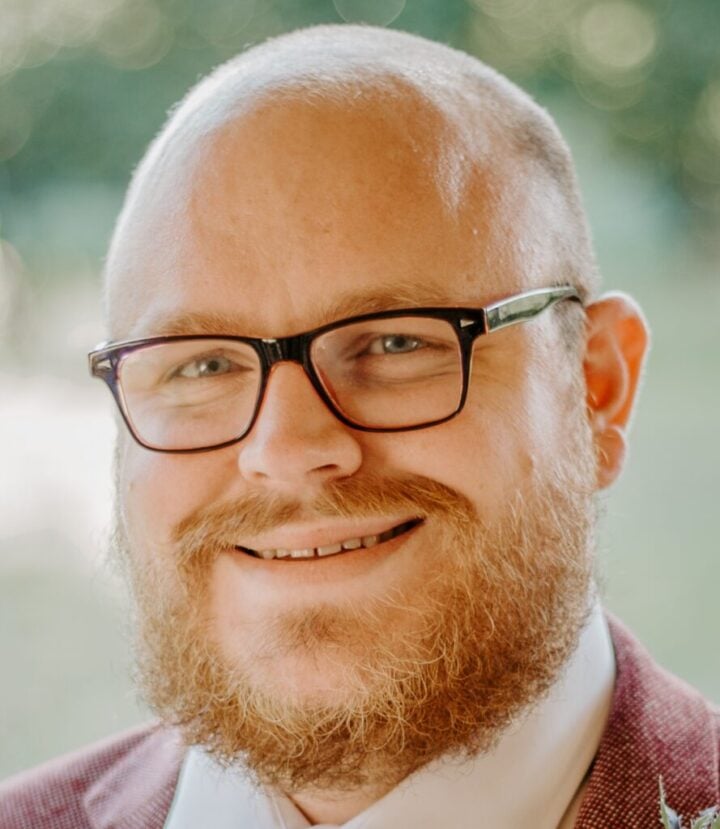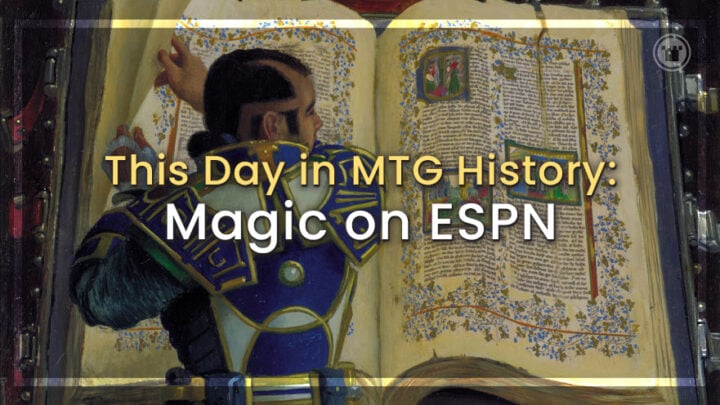Welcome to another edition of “This Day in Magic History.” Today, we’ll be taking a look at the first time ESPN broadcasted a Magic event.
On Oct. 21, at 10:30 p.m.,a portion of the 1997 World Championship aired on ESPN2. While we are used to coverage of major Magic events today, this marked the very first time that a Magic event was ever broadcast in any way. Before this, the only way to see gameplay at a major event was to physically be there.
In this article, I’ll discuss this broadcast while also taking a look at the broader history of Magic and ESPN.
The Broadcast
We still have the Wizards of the Coast press release announcing the broadcast of this event, and it gives us some pretty interesting insights into how Wizards of the Coast viewed this broadcast. Most notably, the release notes that then-Wizards of the Coast CEO Peter Adkinson said “The ESPN2 program legitimizes Magic: the Gathering as an intellectual sport.”
In other words, Wizards of the Coast was looking to expand beyond their main demographic and get more people who are interested in athletic competition interested in Magic.
While one can understand Adkinson’s excitement, it should be noted that ESPN2 was not exactly mainstream in 1997, especially in its later time slots. It was less than four years old at the time, far from available in every household and often featured off-the-beaten-path sporting events.
You could catch Magic events on occasion, but you would also see billiards, mini-golf and competitive eating. If you’ve seen the movie “Dodgeball,” this is where all the jokes about ESPN 8 “The Ocho” come in.
Still, broadcasting Magic to the masses at all was a big deal. While some folks had recorded earlier World Championship matches, those videos were far from accessible.
You can actually see the very beginning of this broadcast on YouTube, and it is a very interesting watch considering how ESPN wanted to package the game. In this portion that survived, the game is introduced to viewers and the events of that year’s Pro Tours are recapped.
Special attention is given to the competitive rivalry of Mike Long and Mark Justice, the two best players of the era. The broadcast went to great lengths to relate Magic to sports, such as comparing Long to Rodman. Long was one of the most successful players at the time, but also a controversial figure for some of his behavior.
Players’ reviews of this broadcast were largely negative. For one thing, unlike most sporting events aired on ESPN, this was not a live broadcast — or even close to it. The 1997 World Championships aired more than two months after their conclusion in August.
Additionally, the broadcast was split in two and separated by more than two months, with the conclusion of the 1997 World Championship not aired until Nov. 26! It was also virtually impossible to see what cards were in play, and some of the hosts had limited knowledge about the game.
In short, many felt it was neither an effective way to introduce the game to people nor a useful broadcast for enfranchised players. However, despite these problems, this marked the beginning of a multiyear relationship between Magic and ESPN.
After the First Broadcast
Between 1997 and 2000, seven different competitive Magic events aired on ESPN2. This included the World Championships for each of those years, as well as three other events in 2000: Pro Tour New York, U.S. Nationals and Pro Tour Chicago.
ESPN cleaned up many of the issues with earlier broadcasts over time. These fixes included much-improved camera work that allowed viewers to see the cards better and more knowledgeable commentators, like Randy Buehler, who would go on to be a Magic commentator for many more events over the next two decades. By 2000, Magic also received better time slots around midday instead of the middle of the night.
ESPN2 held its final broadcast for the 2000 World Championships, which aired on Sept. 29, 2000. In the end, neither side was particularly impressed with what the broadcasts had accomplished.
For ESPN, the ratings were far too low. For Wizards of the Coast, the broadcasts hadn’t spread Magic to a new audience. As far as they could tell, the game grew very little as a result of ESPN2.
End Step
While the broadcast of Magic on ESPN was ultimately a failure, it did represent an important moment in the history of the game. Coverage of professional events would drastically expand from this point on, with Wizards of the Coast ultimately taking matters into their own hands and providing text and video coverage of major Magic events — something that is still going on today!

Jacob has been playing Magic for the better part of 24 years, and he especially loves playing Magic’s Limited formats. He also holds a PhD in history from the University of Oklahoma. In 2015, he started his YouTube channel, “Nizzahon Magic,” where he combines his interests with many videos covering Magic’s competitive history. When he’s not playing Magic or making Magic content, he can be found teaching college-level history courses or caring for a menagerie of pets with his wife.

